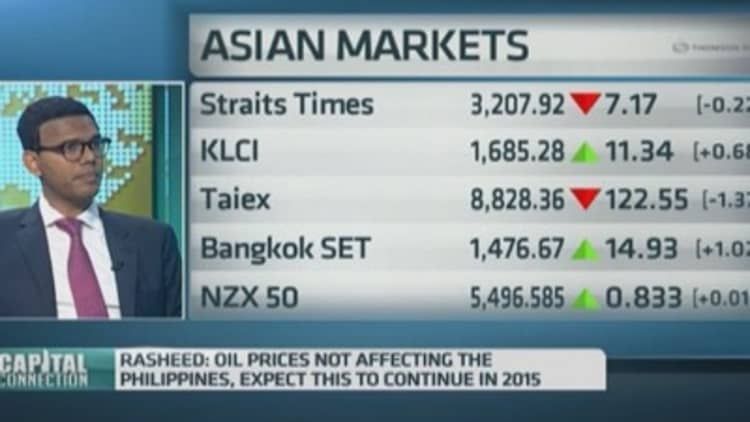Political unrest kept tourists away from Thailand for much of this year, but a surge in Chinese tourists over the past two months may signal a recovery next year, analysts say.
"Thailand's tourism sector, which was a key growth driver before the most recent political crisis, finally looks to be on the mend, and should add much-needed support to the economy going into 2015," Capital Economics said in a note last week.
Political unrest this year, triggered by a parliamentary bill in November 2013 that could have allowed the return of an ousted leader, saw the removal of the incumbent prime minister and ended with a coup d'état in May 2014, dented Thailand's tourism sector, which accounts for around 10 percent of gross domestic product (GDP).
Visitor arrivals were down 12 percent on year from January through September, data from Thailand's Department of Tourism show, weighed by protests and outbreaks of violence in the first half of the year and caution among travelers thereafter.
Nearly a year ago, the government had forecast 2014 GDP growth of 4.0-5.0 percent, but the impact of the political crisis and weak imports saw government officials cut their forecasts. In December, Finance Minister Sommai Phasee said the economy may expand less than 1 percent this year.
China to the rescue
But Thailand's tourism sector appears to be turning a corner. Visitor arrivals increased 4.2 percent on year over the October-November period, led by a surge in Chinese tourists.
"The rebound in Chinese tourists is significant as they have become increasingly important to Thailand's tourism performance in recent years, Capital Economics said. Chinese tourists accounted for 17 percent of foreign visitors in 2013.

"Chinese visitors are also among the biggest spenders, with per capita spending per day about 10 percent higher than the overall average," it added.
"To stimulate tourist arrivals, Thailand launched a visa-fee waiver scheme for China and Taiwan passport holders from 9 August to 8 November. Despite the end of Thailand's fee-waiver period, Chinese tourist arrivals in Thailand rose 2.5 percent on month to a record 513,441 in November," CIMB said in a note last week.
"We expect Chinese tourist arrivals in the region to continue recovering as political stability returns to Thailand," CIMB said.
Europe to drag
Weakness in Europe's economy and the geopolitical fallout in Russia are a headwind for Thailand's tourism sector, Capital Economics says.
"European visitors spend even more than Chinese tourists during their visits on a per capita basis, largely reflecting their considerably longer stays in Thailand. But with European economies struggling, the performance of this sub-sector is likely to be lackluster," it said.
"In particular, visitors from Russia, which accounted for 28 percent of European visitors and registered the fastest growth within the region in 2013, will probably disappoint in light of the recent slump in the ruble," it said.
Read MoreWhat coup? Thailand stock exchange sees more gains
The Russian ruble depreciated over the past few months – down over 50 percent year-to-date at its weakest levels last week – amid a sharp decline in crude oil prices and Western sanctions due to Russia's annexation of Crimea and continued conflict with Ukraine.
However, Credit Suisse disagrees. While it expects "Russian tourist arrivals could by fall as much as 40 percent in 2015," it believes "Economic and currency woes in Russia will produce very limited impact on the Thailand tourism industry," it said in a note last week.
"Based on our estimate, a 40 percent fall in Russian tourist arrivals would reduce total arrivals by just 2.5 percent," it said. "We believe growth from China can more than offset the fall in tourists from Russia."
Citigroup agrees: "Russia's economic difficulties, including a depreciating ruble, will negatively affect Russian visitation to Thailand… [but] upside from Chinese tourist arrivals should more than compensate," it said in a note last week.
Growth driver
Thailand's tourism sector will likely become a growth engine again in 2015 after being a drag this year, Capital Economics said.
"If tourist arrivals reach the Tourism Minister's forecast of 29 million in 2015, up from about 25 million this year, GDP growth would receive a boost of about 1.6 percentage points," it said.


